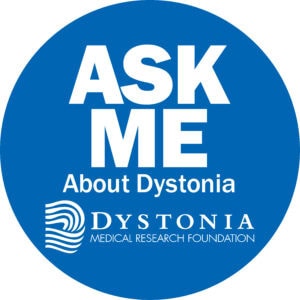How to Promote Dystonia Awareness in September

During the month of September, the DMRF is asking YOU to help raise awareness of dystonia. As many as 70% of patients are misdiagnosed prior to receiving a dystonia diagnosis, so spreading knowledge within the medical profession can be just as important as sharing information outside of it.
The theme for this year’s Dystonia Awareness Month is “Ask Me About Dystonia.” If family members, friends, or strangers have questions, you can guide them to medically accurate answers. For members of the dystonia community who are coming to terms with a new diagnosis or struggling with this chronic condition, the DMRF offers a wide variety of informational resources and support.
Encouraging Others to Ask About Dystonia
In-person community events: Dystonia Zoo Day events are an opportunity to gather the local dystonia community, promote awareness, and support the mission to find a cure—the event T-shirts encourage other people to ask about dystonia. There are seven more Zoo Day events scheduled for August, September and October, plus the Angels Walk for Dystonia and the Warriors Ride. Details about these events are available on the DMRF website events page.
Virtual YOU Day (Sept. 30): This year, we’re proud to introduce Virtual You Day. This is a new kind of event designed to help you take back your power through self-care. It’s about focusing on what you can control, creating space to care for yourself every day, and finding strength in community. Living with dystonia can be overwhelming—but knowledge, support, and intentional self-care can help restore a sense of control and resilience.
“Ask Me” buttons: The “Ask Me About Dystonia” buttons are available in our online store as a conversation starter about this condition. Whether you wear the button on your clothing or keep it on your backpack, the button lets people know that you are open to educating others about dystonia and its impact on your daily life.
Like and share DMRF social content: Throughout the month of September, there will be a series of posts and videos on our social media platforms answering basic questions about dystonia, in addition to the latest news of upcoming community events like Dystonia Zoo Days.
Share your story: Whether you’ve experienced dystonia or know someone who has, sharing your personal journey on social media can make a powerful impact. In your daily interactions, consider all the opportunities to share your dystonia story, aiming to educate and raise awareness. If your contacts have additional questions about dystonia, direct them to the DMRF website for more information.
Other Ways to Help
Connect with support groups: Engaging with local dystonia support groups helps foster a sense of community. By attending these meetings, you can share experiences and provide support to individuals and families affected by dystonia. A support group calendar is available on the DMRF website. If there isn’t an in-person support group nearby, you can reach out to the leaders of a virtual or hybrid support group in any part of the country that fits your schedule.
Advocate for dystonia: Contact the DMRF to receive information on advocacy issues and then reach out to local representatives, healthcare providers, and policymakers to raise awareness about dystonia and advocate for increased funding, improved access to treatment, and better support systems for those with dystonia.
Educate others: Spread knowledge about dystonia by sharing informative resources, facts, and articles in person on social media. The DMRF provides free educational publications, fact sheets, and brochures about different types of dystonia and other issues related to this condition. You have the power to dispel misconceptions and promote accurate understanding of the disorder. Email us at [email protected] to order print materials.
Sign Up for the Digital Dystonia Dialogue: If you are a Dystonia Dialogue subscriber, share your copy with a friend, family member, or your doctor’s office when you are finished reading it. Sharing the magazine helps spread the word and maximizes its use before being recycled or discarded. You can also sign up to receive the digital edition of the Dialogue, which arrives well in advance of the print edition, and you can share individual articles easily with your contacts.
Start a Fundraiser: If you have an idea for a fundraiser, reach out to the DMRF at [email protected]. You can also collect donations for the DMRF through Facebook’s fundraiser tools; be sure to notify DMRF of your fundraiser. We welcome your support!
Join the Global Dystonia Registry: The Global Dystonia Registry complements the work of the Dystonia Coalition, a clinical research effort supported by the National Institutes of Health. The goal of the Global Dystonia Registry is to support future dystonia studies, including clinical and research trials. Although the focal dystonias have many different manifestations, most experts believe they share a common pathogenesis or mechanism that causes the disorder. The common causes may be a similar gene defect, similar lifetime experiences, or both. Collecting information from different patient populations may help us identify the common features that they may share.
